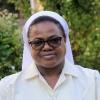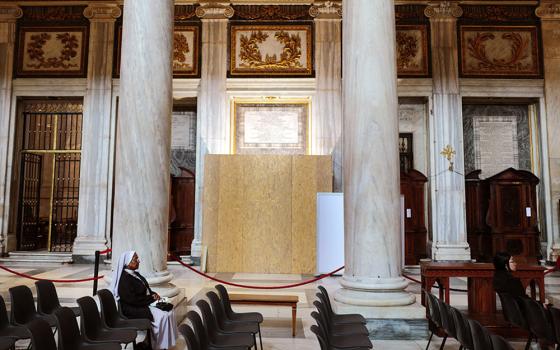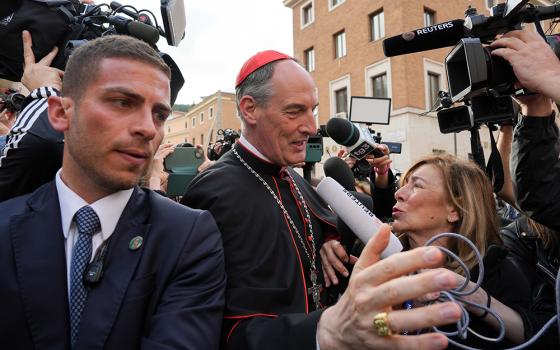Pope Francis greets Claretian Missionary Sr. Jolanta Kafka, president of the International Union of Superiors General, during a May 5 audience with participants in the plenary assembly of the union at the Vatican. (CNS/Vatican Media)
Editor's note: On March 13, 2013, Cardinal Jorge Mario Bergoglio became Pope Francis. This week, leaders of four organizations of women religious reflect on what his papacy has meant, particularly for women religious, in columns for Global Sisters Report. Read more about Pope Francis' 10th anniversary from the National Catholic Reporter.

"What would the church be without religious sisters and consecrated laywomen?" These were the words of Pope Francis in a video released Feb. 1, 2022, to mark his prayer intention for the month to be for consecrated women.
Pope Francis insisted in the video that "the church cannot be understood without them" — religious women and consecrated laywomen! Again, Pope Francis encouraged women religious to fight when they are treated unfairly, even within the church. This is a bold move from the pope of a church whose culture over the centuries has ensured women maintained a low profile with regard to crucial decision-making.
The church leadership structure has had little room for women's involvement in important decision-making processes. The clergy have authority on matters spiritual, dogmatic and theological, and they administer all church goods, spiritual and secular. This has led to criticism that the church is too clerical. In some parts of the world, many parish councils that play an advisory role to the clergy have few, or no, women.
Yet the role of women religious cannot be overemphasized: They play a significant role in many aspects of church life. They act as spiritual leaders and guides, as educators, as key people for medical and social life issues as well as in catechesis of the young and old alike. Women religious journey with some of the most vulnerable groups of society. Institutions owned and run by institutes of women religious are grounds for imparting the Gospel and societal values and spaces for evangelization. Despite this contribution to the church and society, women religious have continuously been overlooked in key decision-making processes and have had to keep a low profile while unpretentiously, yet joyfully, living their vocation among God's people.
According to Pope Francis, women religious should not be cheap labor for the church.
As we mark the 10th anniversary of Francis' papacy, the church also celebrates a completely new perspective of women religious as demonstrated by this pope. Francis has consistently insisted that women religious keep their gaze on their mission, which is to selflessly serve humanity without being reduced to servitude. According to Pope Francis, women religious should not be cheap labor for the church.
In the 10 years of his service as the vicar of Christ, Francis has taken every opportunity to openly show his appreciation and affection for women religious and their role in their communities, within the church and in society. He has opened a number of doors for the participation of women religious in church affairs. His faith in women religious can be seen in the various appointments, often for the first time, of sisters to critical church positions and high-ranking Vatican offices. Trusting women religious with such critical and sensitive church offices is a sign that he is charting the path for inclusion and loudly stating that the church can no longer ignore the unique contribution of women religious to the life of the church and society.
In November 2021, Pope Francis appointed Sr. Raffaella Petrini, a Franciscan Sister of the Eucharist, as secretary-general of the Governorate of the Vatican City State. In July 2022, the pope appointed Petrini; Sr. Yvonne Reungoat, a member of the Society of Salesian Sisters / Daughters Mary Help of Christians; and Maria Lia Zervino, president of the World Union of Catholic Women Organizations, to the Dicastery for Bishops, responsible for identifying future bishops globally. Also named to the Roman curia was Sr. Nathalie Becquart as the undersecretary of the General Secretariat of the Synod of Bishops.

The Association of Consecrated Women in Eastern and Central Africa, or ACWECA, is comprised of the national associations of women religious from nine African nations: Eritrea, Ethiopia, Kenya, Malawi, Republic of Sudan, Tanzania, Uganda, South Sudan and Zambia. Pictured is the organization's board, from right: Sr. Auxilia Hokororo of Tanzania; Sr. Sylvia Kagulura of Zambia; Sr. Maria Speranza Namusisi of Uganda; Sr. Josephine Kangogo of Kenya; Sr. Bridgita Samba, secretary-general; Sr. Rosalia Sakayombo, president; Sr. Agnes Jonas of Malawi; Sr. Alice Drajea of South Sudan; and Sr. Lujina Gebrewold of Ethiopia. (Courtesy of ACWECA)
This shows the significance Pope Francis has given to women in the church and his conviction that women, too, can serve critical church offices with dedication and professionalism.
In May 2022, the pope defied his failing health to address the International Union of Superiors General at their plenary assembly in Rome, where hundreds of superiors general from all over the world had met under the theme of embracing vulnerability in a synodal church. Pope Francis himself seemed to be sending a message of embracing his own vulnerability to assure the leaders of women religious across the globe of his belief and trust in their worth and contribution to the advancement of humanity. Appearing in his wheelchair in public for the first time, Pope Francis told the UISG plenary that he counted on the sisters to accompany the people of God in building synodality.
Pope Francis exhorted the sisters not to lose sight of their vision of accompanying the frail and those on the margins of society. He encouraged them to approach the feet of the wounded humanity and walk alongside them, beginning with the sisters of their communities. This is the essence of the church that women religious want to see: the people of God walking together.
Pope Francis recognizes the uniqueness of the contribution of women in the synod journey. In an Oct. 11, 2019, meeting with members of the Congregation of the Sisters of Charity of St. Jeanne Antide, Pope Francis showed an admiration of the role of women in the lives of others. He said that "consecrated women are an extension of the female presence which walked with Jesus and with the Twelve."

Sr. Carmen Sammut, superior general of the Missionary Sisters of Our Lady of Africa and the outgoing president of the International Union of Superiors General, gives her address alongside Pope Francis during a meeting of the organization May 10, 2019, at the Vatican. (CNS/Reuters/Vatican Media)
The pontiff understands the magnitude of the mission of consecrated women, who work with the most vulnerable and marginalized of society without counting the cost and many times without the much-needed resources to ensure these vulnerable people of our society are well cared for. The sisters go out of their way with meager resources, and sometimes with little knowledge and skills for the work. They work not for the benefit of a salary, but because of the faith and belief they carry deep in themselves as Christians, following after the footsteps of Jesus Christ, who dedicated his life for his brothers and sisters in need of his love and mercy.
We must joyfully embrace the synodal journey. Yet this journey has also shown glaring gaps with regard to the participation of women religious. The composition of many of the synod opinion-gathering teams lacked women, an indication that women and religious women in particular were not represented in mainstream and official structures of the church. Pope Francis intended this process to truly reflect the universal church, so he ensured everybody could participate in the process through the formation of other discernment and listening spaces outside the formal synodal local, diocesan and national teams. These spaces ensured the participation of many groups like youth, as well as lay and women religious, whose voices would normally be left out.
Advertisement
For the mission of the church to be more meaningful in our contemporary world, true communion has to be experienced through brotherly and sisterly participation. Women religious live synodality in their daily lives of prayer and community, sharing each other's joys and burdens, offering hope to the hopeless, and being witnesses to the Christian values through their simple lives lived in charity. Pope Francis' papacy has reinforced these ideals, and for the religious women the world over, it is a new beginning where the mother church can truly show the way for the many broken and hopeless brothers and sisters subjected to all forms of violence and attacks on their dignity as seen in the faces of refugees, victims of trafficking, broken families, and in the many victims of natural and manmade calamities.
Pope Francis' way of ensuring inclusivity in the church has endeared him to women religious. For the women religious the world over, the papacy of Pope Francis means a beacon of hope in the quest for an all-inclusive church.









